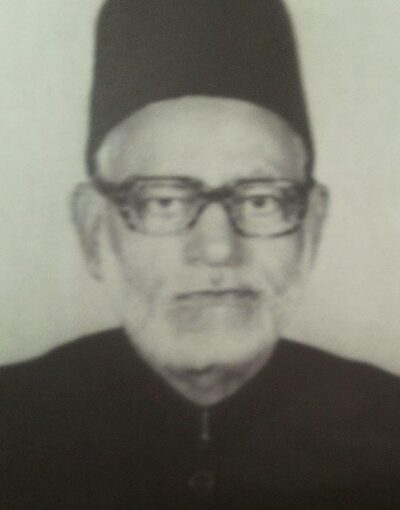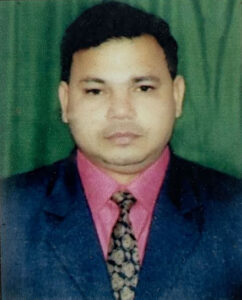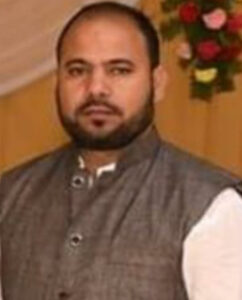Brief Profile
Prof. S. M. Suleman Abbas

Professor Suleman Abbas: A Visionary Humanitarian and Advocate for Education
Professor Suleman Abbas, also known as Moulana Suleman Abbas, was a remarkable humanitarian whose 62 years of life were dedicated to transforming the lives of those he touched. Born in 1924 in Eastern Uttar Pradesh, India, he became a renowned scholar, educationist, linguist, philanthropist, social reformer, and religious preacher, whose impact extended across the Indian subcontinent. His relentless commitment to education, social upliftment, and interfaith harmony left a profound legacy that continues to inspire future generations.
Though his birthplace was in Eastern Uttar Pradesh, Professor Abbas regarded all of India as his “karmabhoomi,” or land of action. His journey toward becoming a beacon of inspiration began when he lost his father at the tender age of 14. Despite this personal tragedy, Professor Abbas not only took charge of his own life, diligently pursuing his education through scholarships, but also devoted himself to building a character that would exemplify resilience, wisdom, and service to others.
Professor Abbas’ early education began at Sultan-ul-Madaris in Lucknow, where he studied alongside prominent contemporaries such as the revolutionary poet Kaifi Azmi and the eminent religious scholar Moulana Kalbe Sadiq. While pursuing his studies, he supported himself by tutoring the children of the Raja of Mehmoodabad, who was deeply impressed by the young Abbas’ intellect and teaching abilities. Following his academic tenure at Sultan-ul-Madaris, he advanced his education at the prestigious Aligarh Muslim University, where he earned Master’s degrees in both Arabic and Persian, excelling at the top of his class in both disciplines.
Professor Abbas began his professional career as a lecturer at the Anglo Arabic College (now Zakir Husain College), a constituent institution of the University of Delhi. In 1960, he accepted a position at Banaras Hindu University (BHU) as a Lecturer in the Department of Arabic, Urdu, and Persian within the Faculty of Arts. This move, driven by a desire to be closer to his hometown of Azamgarh, allowed him to contribute to his village and community while also advancing his academic career.
While living in the serene environment of BHU, Professor Abbas dedicated himself to improving the educational and health prospects of the youth in his ancestral village, Qazi ki Digwania in Azamgarh. He frequently visited the village, engaging in inspirational discussions with his childhood friends and their children, encouraging them to pursue education and self-betterment. Many young men and women, spurred by his guidance and support, relocated to Varanasi to further their studies. Professor Abbas not only facilitated their admission to various academic institutions but also sheltered them in his humble faculty residence at BHU and, at times, extended financial support to cover their educational and living expenses. As a result of his tireless efforts, many of these individuals went on to hold esteemed positions in academia and other professions in India.
Professor Abbas’ philanthropic work was not limited to his immediate village. With the unwavering support of his educated and compassionate wife, Mrs. K. Bano, he opened his home and heart to countless students and individuals from Eastern Uttar Pradesh, assisting them in both their educational pursuits and health needs. Many benefited from his financial assistance and access to medical care at Sir Sunderlal Hospital in BHU.
A man of strong character and integrity, Professor Abbas was known for his confidence and eloquence. He often spoke on behalf of his fellow faculty members and residents of Hyderabad Colony, advocating for their rights and presenting their concerns to university authorities and other officials. His proficiency in multiple languages, including Hindustani and English, made him an effective representative, leading delegations to Delhi to present petitions before influential figures. His presence and contributions were recognized in the book Dilliwaaley, a tribute to prominent individuals in Delhi.
Professor Abbas’ intellectual and spiritual contributions extended beyond academia. He was a regular speaker at the Theosophical Society in Varanasi, where he delivered lectures on comparative religion, promoting interfaith dialogue and understanding. A skilled linguist, he engaged in pioneering research on the origins of Arabic, Devanagari, and Roman scripts, though much of his work remained unpublished. Additionally, he supported budding poets in refining their craft and was known for his sharp wit and warm sense of humour, making his company both intellectually stimulating and enjoyable.
A true secularist, Professor Abbas believed in fostering unity among various religious communities. His household celebrated Hindu festivals such as Deepawali, Holi, and Saraswati Puja, encouraging his children to partake in these celebrations as a symbol of harmony and mutual respect.
Professor Abbas’ legacy lives on through his children and extended family including that of his elder brother S. Muzammil Husain Rizvi father of Hakeem S. Shane Raza and prof Dr S. Iimran Raza, many of whom have followed in his footsteps as educators and professionals. His eldest nephew retired as a Professor of Arabic at BHU, and three of his children became professors at central universities in India. His eldest son excelled as the Head of All-India Sales for a multinational pharmaceutical and FMCG company, while another son became a senior producer at a major media house. His youngest son currently leads the sales operations for an IT hardware company.
To honour their grandfather’s extraordinary legacy, Professor Suleman Abbas’ grandson Zamanat Abbas and his brothers took the initiative to establish the MSA Academy in Qazi ki Digwania, Azamgarh. This educational institution is a profound tribute to his lifelong commitment to promoting education, social reform, and community welfare. By providing quality and affordable education to the children and youth of the village, the academy seeks to continue the noble mission that Professor Abbas had devoted himself to—empowering the younger generation through knowledge and learning.
The MSA Academy reflects the core values and principles that Professor Abbas stood for throughout his life: compassion, inclusion, and the belief that education is the most powerful tool for personal and societal transformation. Professor Abbas, who himself rose from humble beginnings and pursued education against many odds, was a firm believer in the idea that access to education should not be a privilege reserved for the few, but a right available to all. The academy carries forward this vision by ensuring that children from diverse backgrounds, regardless of caste or creed, receive the opportunity to learn, grow, and fulfil their potential.
The founding of the academy is more than just a tribute—it is an embodiment of Professor Abbas’ enduring legacy of educational and social reform. His grandsons, inspired by his values, established the institution as a way to carry forward the light he once ignited in his village and beyond. By doing so, they have created a lasting impact on the lives of many children who now have access to quality education in a nurturing environment.
Professor Abbas’ legacy transcends his lifetime, and the MSA Academy stands as a symbol of his remarkable contributions to society. His tireless work as a scholar, teacher, and community leader left an indelible mark on everyone who knew him, and the academy ensures that his vision for a better, more educated future continues to inspire and influence new generations. The school is not just an educational institution—it is a beacon of hope, an enduring testament to the power of education, and a reminder of Professor Suleman Abbas’ unwavering dedication to the betterment of society.
Through this initiative, the light Professor Abbas once kindled continues to shine brightly, shaping the futures of countless young minds. His legacy of education, compassion, and interfaith harmony endures, reminding us of the transformative impact of one man’s vision and his steadfast commitment to making the world a better place.

Manager M.S.A. Academy & Educational Society
Mobile No.: +91-87266 80994

Treasurer M.S.A. Academy Educational Society
Mobile No.: +91-8081755152
